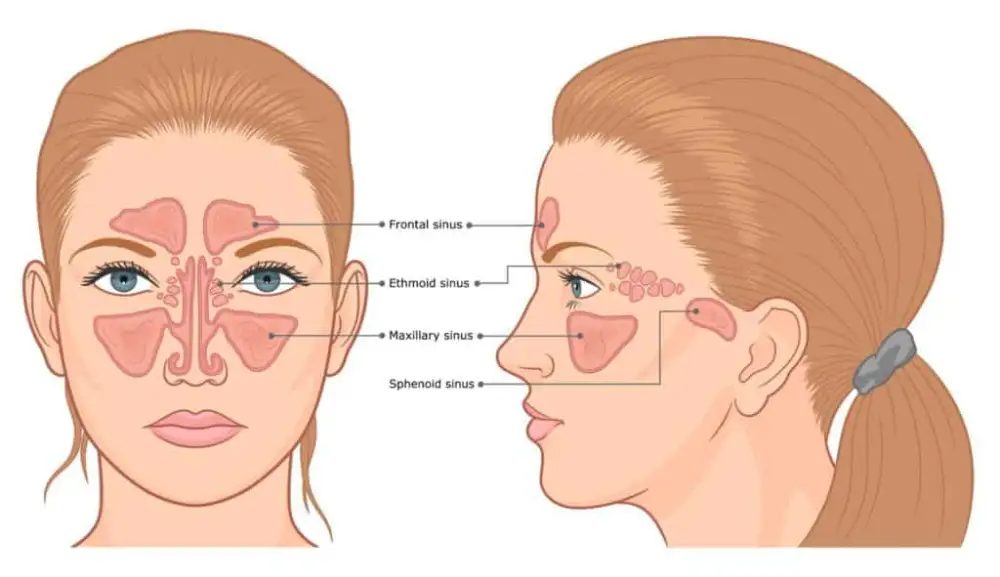Sinus headaches can be extremely painful, but they are often misdiagnosed for migraines or regular headaches, which have different treatment options. In this article, we explore exactly what a sinus headache is, what causes them, and provide some of the best treatment options so that you can get some relief from your pain.
What Is A Sinus Headache?

The sinuses
A sinus headache can only come from sinusitis (rhinosinusitis)—an inflammation of the sinuses that can last up to eight weeks. Many people believe they have a sinus headache when they usually have a migraine. There’s an obvious difference between the two: if your headache is accompanied by migraine symptoms like nausea, vomiting, and sensitivity to light, you are more likely to have a migraine. Similarly, if you have a headache but none of the symptoms of sinusitis like nasal congestion, a runny nose, and head pain when you bend over, you are more likely to have a regular headache.
Your sinuses are four air-filled spaces behind your forehead, nasal bones, cheeks, and eyes. They are usually empty aside from a thin layer of mucus. If you have allergies, a cold, or a flu, the membranes in your sinuses can become irritated, inflamed, and filled with mucus that can’t drain away. This causes congestion, which encourages the growth of bacteria or viruses, leading to a sinus infection and a potentially painful headache. Nasal polyps (abnormal growths) in the nose or sinuses can also cause sinusitis, as can a deviated septum. Finally, habits like smoking, regular airplane travel, scuba diving, or other activities that involve air pressure changes in your sinuses can lead to sinus infections.
There are two types of sinusitis:
- Acute sinusitis—this usually lasts for about 10 days, and no longer than eight weeks. It can be treated with medications like antibiotics and painkillers.
- Chronic sinusitis—this lasts longer than eight weeks and returns more than four times a year. It may be treated with nasal corticosteroids, allergy medications, and more.
Sinusitis and the headaches that can accompany it are not considered to be contagious.
Sinus Headache Symptoms
Sinus headache is usually accompanied by sinus infection symptoms. If you’re suffering from this type of infection, you might experience the following common symptoms:
- Pain that feels like a dull ache behind your cheeks, forehead, and nose
- Difficulty breathing through your nose
- A runny nose
- Thick, yellow or green nasal discharge
- Postnasal drip (mucus in your throat, frequent swallowing, and the urge to clear your throat regularly)
- A poor sense of smell
- A feeling of pressure behind your forehead, or fullness in your ears
- Swelling or tenderness around your nose, cheeks, eyes, or forehead
- Higher levels of pain when you bend over
- Fever
- Achy muscles
Less common symptoms include:
- Earache
- Jaw ache or toothache
- A sore throat
- Bad breath
- Fatigue
How Do Doctors Diagnose Sinus Headaches?
A doctor will examine you and ask about your symptoms to determine whether the headache is from sinusitis, or something more common like a migraine or regular headache. If the headaches are frequent and severe, they may complete a test such as an MRI, X-ray, CT scan, or nasal endoscopy to identify sinus blockages, which can help them to recommend the right treatment for you.
How To Get Rid Of A Sinus Headache
One of the best ways to get rid of a sinus headache is to treat the underlying cause, whether it’s a cold, flu, or seasonal allergies. The most common treatments include:
- If the issue is related to allergies like hay fever, you can try taking an antihistamine. If the problem is severe, you can also talk to your doctor about trying a steroid nasal spray like Dymista. You might also consider talking to an allergy specialist about potential long-term treatment like immunotherapy.
- Prescribed antibiotics if the infection is bacterial or fungal.
- Decongestants to help reduce the inflammation in your nasal passages.
- Paracetamol to reduce the pain, and ibuprofen to reduce the inflammation. You can take these together, but be sure to read the instructions for both before doing so, to avoid taking too many over a 24-hour period.
- Keeping your nasal passages and sinuses moist—drying them out makes the problem worse. The goal is to help your sinuses to drain as much mucus as possible. You can try the following:
- Use a humidifier or vaporizer
- Take long, hot showers or baths
- Drink lots of water
- Use a saline nasal spray, or try a nasal flush/rinse kit like Fess.
- An electronic device like ClearUP that emits waveforms to mitigate sinus pain.
Sinusitis may also go away by itself as your immune system does its work. Your headaches will also cease if this happens.
If you have chronic sinusitis, your doctor may refer you to an ear, nose, and throat (ENT) specialist. They may recommend a procedure like endoscopic sinus surgery, which removes blockages from the sinuses and allows them to drain more easily. But other treatments are usually tried before going down this road.
How To Prevent Sinus Headaches
Because sinus headaches are caused by inflammation and infection of the sinuses, there’s a number of preventative actions you can take you avoid getting them:
- Try to avoid colds and flus by washing your hands regularly, and steering clear of people who are sick.
- If you have allergies like hay fever, you can try vacuuming your house regularly, keeping your windows and doors closed when pollen counts are high, and buying a pollen filter for your car’s air vents.
- Quit smoking, or avoid secondhand smoke.
- If you notice that your headaches are triggered by alcohol or caffeine, try to avoid them.
- Keep the air conditioner off—it dehumidifies the air which can irritate your nasal passages. Try using a fan instead.
- Regularly use a saline nasal spray, or try a nasal flush/rinse kit like Fess. This helps to flush out any bacteria and viruses that cause infections.
- Drink plenty of water to keep your nasal passages nice and hydrated. The moister they are, the less chance you have of getting an infection.
When Should I See A Doctor?
Whether you have sinusitis or not, you should consider seeing a doctor if experience the following:
- Your headache lasts for longer than two weeks
- The intensity of your headache is getting worse
- You are getting more frequent headaches
- The headaches are affecting your life
- You have a fever that has lasted for longer than three days
- Non-prescription painkillers like paracetamol and ibuprofen aren’t working
What Causes Mouth Ulcers? How To Treat & Prevent Them Effectively
Mouth ulcers are a common oral condition that affect most people at some point in their lives. They can be uncomfortable, but they are usually harmless and will heal within 10 to 14 days without treatment. Here’s everything you need to know about mouth ulcers, including what they are, what causes them, the best treatments,…
Acute Vs Chronic Medical Conditions
No matter how old or young you are, we are all susceptible to acute and chronic medical conditions. Both conditions differ in how long they last and how severe the diagnosis is. An illness or condition can be as simple as the flu, or in a more severe case cancer or arthritis. Whether it is…
How Much Sugar Per Day?
Sugar is a type of carbohydrate and a source of energy for our bodies. It can occur naturally in foods like fructose in fruit, glucose in fruits and vegetables, and maltose in wheat and barley. However, manufacturers also often add sugar to extend the shelf life of foods, improve their appearance and/or make them taste…




